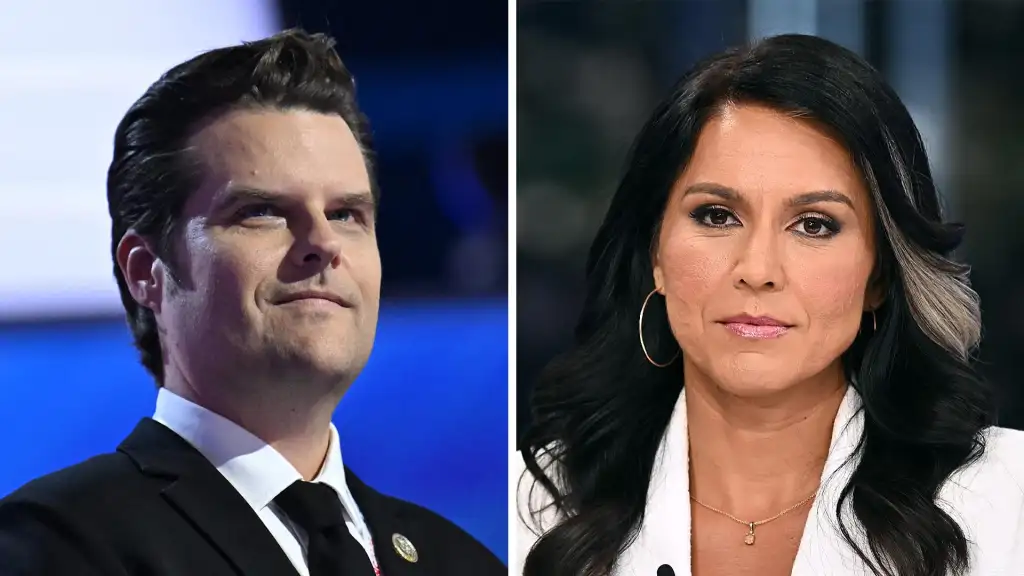
President-elect Donald Trump’s transition team is bypassing traditional FBI background checks for some of his high-profile Cabinet nominees, opting instead to use private companies for vetting potential candidates. The move has raised concerns about both the speed of the vetting process and its implications for national security.
Trump and his allies argue that the FBI system is slow and fraught with inefficiencies, potentially hindering the president-elect’s ability to swiftly enact his agenda. Critics, however, contend that bypassing the FBI’s thorough background checks could open the door to serious risks, including the revelation of damaging or controversial personal information that might affect a nominee’s confirmation.
The decision to sidestep the FBI process comes amid speculation about several controversial picks for Trump’s administration, such as Rep. Matt Gaetz for attorney general and Tulsi Gabbard for director of national intelligence. These choices have sparked concerns due to Gaetz’s ongoing legal issues and Gabbard’s past positions on foreign policy, particularly with regard to U.S. adversaries like Syria and Russia.
Traditionally, background checks by the FBI have been a key part of the vetting process for presidential nominees. The agency’s role is to assess any potential national security concerns and ensure that appointees do not have foreign ties that could jeopardize their loyalty to the U.S. These checks are seen as a safeguard against potential conflicts of interest or improper influences.
However, sources close to Trump’s team say that the president-elect is intent on moving quickly to fill key positions in his administration. Some members of his transition team have privately argued that using private firms for background checks will allow them to expedite the process. This approach would also help avoid what some see as politically motivated delays and leaks that can damage the reputations of those under consideration.
Before the election, some of Trump’s advisers circulated a memo suggesting that the president-elect should bypass traditional FBI checks altogether, in favor of using private researchers who could conduct more efficient and streamlined investigations. While Trump retains the authority to appoint anyone he chooses, including bypassing the formal background check process, critics warn that such a move would break with a long-standing norm and could damage trust in the integrity of his administration.
Controversial Nominees Face Scrutiny
Two of the most controversial picks—Matt Gaetz and Tulsi Gabbard—are likely to face significant hurdles during any confirmation process. Gaetz, the Florida congressman, has been under investigation by the Justice Department and the House Ethics Committee for allegations of sex trafficking and other misconduct. Though the Justice Department declined to file charges, Gaetz resigned from Congress this week as the ethics probe drew closer to its conclusion. Despite his resignation, the probe could still come into play, particularly if he is nominated for a key position like attorney general. Gaetz has consistently denied any wrongdoing.
Meanwhile, Gabbard, the former Democratic congresswoman from Hawaii, has been criticized for her pro-Syria stance and her views on Russia. She met with Syrian President Bashar al-Assad in 2017, and in 2019, she referred to him as “not an enemy of the United States.” Gabbard has also echoed Russian President Vladimir Putin’s rationale for the invasion of Ukraine, which raised alarm among some U.S. allies and lawmakers.
As Trump’s team moves forward with its nominations, the question of whether the FBI should conduct background checks remains a major point of contention. Under normal circumstances, the FBI is responsible for conducting vetting and issuing security clearances. For an attorney general nominee, this process is crucial, as the position requires access to sensitive government information.
Trump’s Precedent for Bypassing the Vetting Process
Trump’s approach to bypassing the vetting process is not without precedent. During his first term, he faced questions about potential conflicts of interest and national security concerns related to his family members and inner circle. In particular, Trump issued security clearances to his son-in-law Jared Kushner, even as concerns about his access to classified information mounted. In fact, Trump overruled the FBI’s objections and granted clearances to around 25 individuals whose applications had been initially denied due to national security concerns.
Despite this, it remains unclear whether Trump’s team will continue to push for the same leniency in vetting his Cabinet picks. Without the formal vetting process, it will be more difficult to confirm nominees, especially if the Senate Judiciary Committee requests information on their backgrounds. While the Senate has the right to request documentation on former members of Congress, such as Gaetz, the decision not to release the report has become a source of contention. The Senate Judiciary Committee has expressed interest in gaining access to any relevant materials, particularly as it prepares to consider nominees for key law enforcement positions.
The Transition Process and Timing Issues
The Trump transition team has faced ongoing delays in submitting names for official vetting, which impacts the timing of classified briefings and the ability of nominees to receive necessary security clearances. As the president-elect will not be sworn in until January 20, it remains unclear when, or if, these nominees will be able to begin receiving briefings on sensitive national security matters.
This reluctance to engage with the traditional vetting process reflects broader concerns about the transition team’s readiness. As was the case in 2016, Trump’s team has faced challenges in preparing for the transition, and it is unclear whether these issues will be resolved by the time he takes office.
Ultimately, while Trump’s team has the authority to bypass formal vetting processes, the long-term implications of such decisions are still uncertain. The nominees in question could face intense scrutiny from both the Senate and the public, particularly if the background checks are bypassed or delayed.







